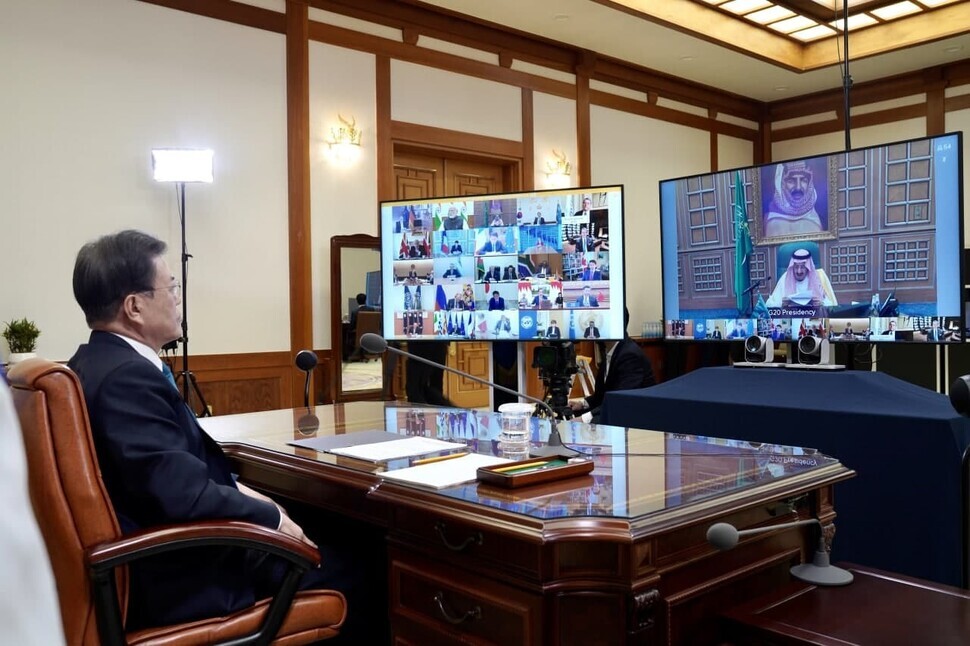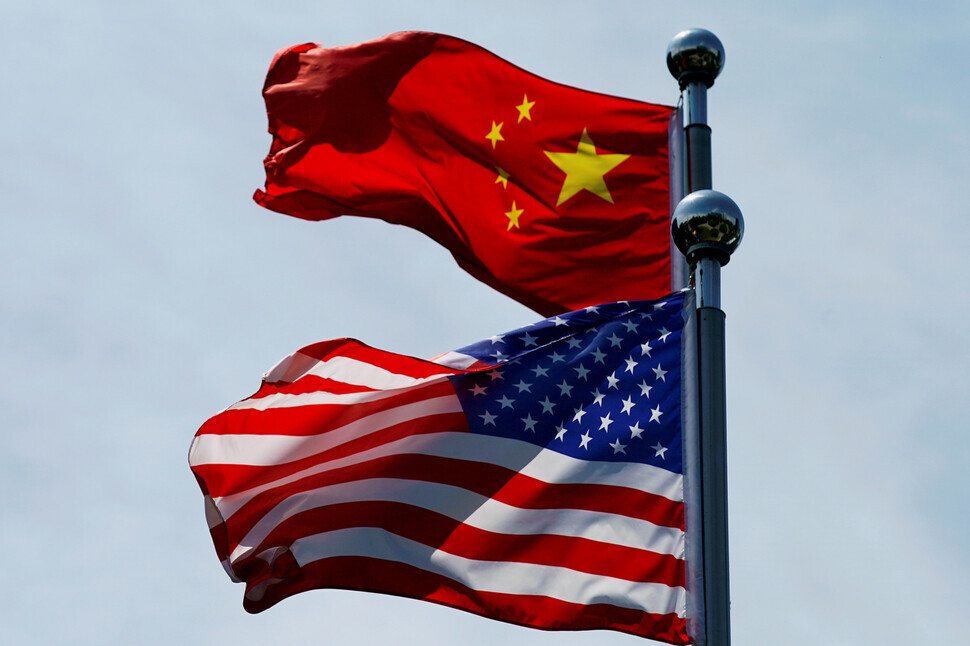hankyoreh
Links to other country sites 다른 나라 사이트 링크
[Column] Breaking S. Korea’s hackneyed “dilemma framework” of US-China diplomacy

South Korea’s opinion leaders in the areas of foreign policy and national security keep harping on the narrative of our “diplomatic dilemma.” It’s taken for granted — regarded as an unshakeable constant — that Korea’s geopolitical reality is a dilemma. But that narrative constrains our creativity and limits our diplomatic options. Paradoxically enough, the dilemma is created the very moment we think we’re in a dilemma.
Those who hold to the dilemma narrative argue that we shouldn’t bother trying to walk a tightrope between the US and China because we might end up being spurned by both sides. Their solution is “principled diplomacy.”
But those principles are, generally speaking, the norms and values of the US-led postwar international order. In the end, that amounts to an either-or choice, with the answer predetermined. Korea is supposed to line up behind the US, our only ally.
But either-or choices aren’t the only approach available in foreign policy. The fundamental reason for diplomacy is creating multiple options.
Narratives sometimes misrepresent or exaggerate reality. Pointing to the “decoupling” between the US and China, many experts argue that strategic rivalry and friction between the two countries are unavoidable. Such an outcome is structurally inevitable, they say, whether they rely on the lens of offensive realism or power transition theory.
Such experts say that nothing will be changed by the inauguration of Joe Biden as US president. The view of China as a threat is bipartisan.
If the argument is that the Biden administration is bound to adopt policies to contain China, they’re not wrong. While the Democratic Party has traditionally supported a policy of engagement toward China, its view of China has indeed been considerably altered by the authoritarian behavior and aggressive policy of Chinese President Xi Jinping.
But it’s an exaggeration to interpret the Biden administration’s policy of China containment as representing a new cold war with the potential of a hot war.
Under US President Donald Trump, “China bashing” has extended from the economy into the areas of ideology and military affairs. Staunch opponents of China such as John Bolton (former national security advisor), Stephen Bannon (former chief strategist at the White House), Peter Navarro (the White House’s director of trade and manufacturing policy) and Robert Lighthizer (US trade representative) have occupied key positions in the US government, forming an alliance with Trump, the populist politician.
The target of these far-right figures is not the geopolitical entity of China but its Communist Party and leader Xi Jinping. Their attacks on the Chinese regime can be seen as a new cold war, representing psychological warfare in the intelligence community that draws sharp distinctions between friend and foe.

Once Biden takes office, these far-right forces, with their vendetta against China, will lose their current government positions. Fundamentally, Biden and the Democrats are adherents of liberalism. They espouse free market economics and seek the support of neoliberal capitalist forces and Wall Street, none of which want the global economy to be wrecked. That has led the far right to even accuse the Democrats of being pro-China.
Sensitive to rife anti-Chinese sentiment in the US, Biden’s camp has even taken a tough stance on Hong Kong and other human rights issues, for political reasons. But he’s nothing like the warmongers who want to crush China before it can grow any bigger. The Biden camp’s emphasis on alliances is also largely a reaction to Trump’s wrecking-ball approach.
To be sure, Biden has promised to work with American allies to respond to the “challenge” of China. But that basically appears to be more defensive than offensive in nature, more designed to hedge against future risk than to rally forces for a fight with China. That’s clearly distinct from unilaterally pressuring allies to make an either-or choice.
The strategic rivalry will continue in US-China relations. But it will be more a competitive coexistence than a new cold war, and it’s realistic to think that the conflict between the two countries will enter a lull for the time being as both sides take time for readjustment. At the very least, the Trump administration’s Indo-Pacific strategy, which had earned the support of US national security elites in the Pentagon and the CIA, is likely to be rebranded.
Given all these points, South Korea is likely to have a little more room to breathe, diplomatically speaking, during a Biden administration. From an economic point of view, South Korea’s decision to participate in the Regional Comprehensive Economic Partnership (RCEP) was only natural. As for other areas of bilateral conflict between the US and China, including 5G, the Quad (a strategic dialogue between the US, Japan, India and Australia), the THAAD missile defense system, the South China Sea and Taiwan, South Korea can simply base its decisions on the merits of each issue.
N. Korea policy under a Biden administrationThat also goes for North Korean policy. Under a Biden administration, the North Korean nuclear issue is likely to become an area for cooperation, rather than a source of conflict, between the US and China. Biden has promised to work with South Korea and China in pushing for North Korea’s denuclearization.
Some argue that Biden will maintain a firm line on North Korea since the North Korean nuclear policy issue isn’t a top priority for him and because he emphasizes North Korean human rights. But that puts too much focus on the US, to the exclusion of South Korea’s position and the role it can play.
Furthermore, North Korea has already demonstrated its ability to manufacture a 100-kiloton hydrogen bomb with its sixth nuclear test and its ability to strike the continental US with its successful test launch of the Hwasong-15 intercontinental ballistic missile. The North Korean nuclear issue will definitely remain an urgent one for the Biden administration.
In the long term, South Korea needs to delineate a clear direction for its China policy in the context of US-China relations. Given geopolitical and geoeconomic factors, our only choice is engagement. While containment is necessary on some issues, joining an anti-China alliance or blockade goes against our strategic interest.
We need not get entangled in regional disputes that are unrelated to our critical interests. That’s something we need to make clear to the US.
Korea’s perpetual defeatism and lack of internal strength when it comes to foreign policyThe narrative of the “diplomatic dilemma” smacks of small-state thinking and defeatism. Historically, Korea had to submit to the suzerainty of China and was colonized by Japan. After liberation, the division of the Korean Peninsula drew a sharp ideological boundary embodied by the Cold War, producing in us a victim mentality. Without even realizing it, we’ve allowed such attitudes to dominate our foreign policy narrative.
Koreans’ national pride continues to soar because of economic growth, the growing popularity of Korean culture overseas (the Korean Wave), Korea’s effective battle against the COVID-19 pandemic, and its mature democracy and civic consciousness. But opinion leaders in the area of foreign policy and national security perpetuate a defeatist narrative.
South Korea ranks 10th globally in economic power and ninth in military strength, with a population of 50 million; in short, it’s not a small country. Trump suggested that South Korea join an expansion of the Group of Seven (G7) advanced economies; it has also been invited to attend next year’s G7 summit, in the UK. Perhaps South Korea will become the second Asian country, after Japan, to “leave Asia and join the West,” as a 19th century Japanese reformer once advocated.
While advanced Western economies such as France, Germany, Italy and Canada are also affected by the US-China conflict, they don’t describe themselves as facing a “diplomatic dilemma.” Some may complain that South Korea faces a hostile geopolitical environment, hemmed in as it is by powerful countries. But in the globalized and digitized era of the 21st century, we shouldn’t treat our geopolitical environment as destiny.
The limits of “middle power diplomacyOne alternative suggested in some quarters is “middle power diplomacy.” Given our greater national prestige, advocates say, we should seek a role tackling world issues on the international stage in the manner of Canada and Australia. That’s also the justification for MIKTA, an international deliberative body composed of Mexico, Indonesia, South Korea, Turkey, and Australia, and the line that the Ministry of Foreign Affairs has held from the presidency of Lee Myung-bak until now.
But I’m worried that “middle power diplomacy” may become another set of shackles that will limit our creativity and potential, just as the “diplomatic dilemma” narrative has done. Under President Moon Jae-in, South Korea got noticed for its proposal for holding a G20 video conference to share South Korea’s experience with battling COVID-19 and to set up an international cooperative body. That’s a good example of Korea acting outside the framework of middle power diplomacy.
Perhaps change doesn’t seem real until it’s right in front of our eyes. In addition to being tiresome, the claim that structural change is impossible reflects the tendency of armchair theoreticians to ignore policy decisions and political dynamics. Rather than worrying about the diplomatic dilemma, we need to break out of that dilemma and think about a grand and bold diplomatic vision, one that goes beyond middle power diplomacy.

By Kim Seong-bae, senior research fellow at the Institute for National Security Strategy
Please direct comments or questions to [english@hani.co.kr]

Editorial・opinion
![[Column] Life on our Trisolaris [Column] Life on our Trisolaris](https://flexible.img.hani.co.kr/flexible/normal/500/300/imgdb/original/2024/0505/4817148682278544.jpg) [Column] Life on our Trisolaris
[Column] Life on our Trisolaris![[Editorial] Penalties for airing allegations against Korea’s first lady endanger free press [Editorial] Penalties for airing allegations against Korea’s first lady endanger free press](https://flexible.img.hani.co.kr/flexible/normal/500/300/imgdb/original/2024/0502/1817146398095106.jpg) [Editorial] Penalties for airing allegations against Korea’s first lady endanger free press
[Editorial] Penalties for airing allegations against Korea’s first lady endanger free press- [Editorial] Yoon must halt procurement of SM-3 interceptor missiles
- [Guest essay] Maybe Korea’s rapid population decline is an opportunity, not a crisis
- [Column] Can Yoon steer diplomacy with Russia, China back on track?
- [Column] Season 2 of special prosecutor probe may be coming to Korea soon
- [Column] Park Geun-hye déjà vu in Yoon Suk-yeol
- [Editorial] New weight of N. Korea’s nuclear threats makes dialogue all the more urgent
- [Guest essay] The real reason Korea’s new right wants to dub Rhee a founding father
- [Column] ‘Choson’: Is it time we start referring to N. Korea in its own terms?
Most viewed articles
- 1New sex-ed guidelines forbid teaching about homosexuality
- 260% of young Koreans see no need to have kids after marriage
- 3Months and months of overdue wages are pushing migrant workers in Korea into debt
- 4Presidential office warns of veto in response to opposition passing special counsel probe act
- 5[Column] Life on our Trisolaris
- 6S. Korea discusses participation in defense development with AUKUS alliance
- 7OECD upgrades Korea’s growth forecast from 2.2% to 2.6%
- 8Hybe-Ador dispute shines light on pervasive issues behind K-pop’s tidy facade
- 9Japan says it’s not pressuring Naver to sell Line, but Korean insiders say otherwise
- 10Opposition calling for thorough investigation into Pres. Park’s unelected power broker